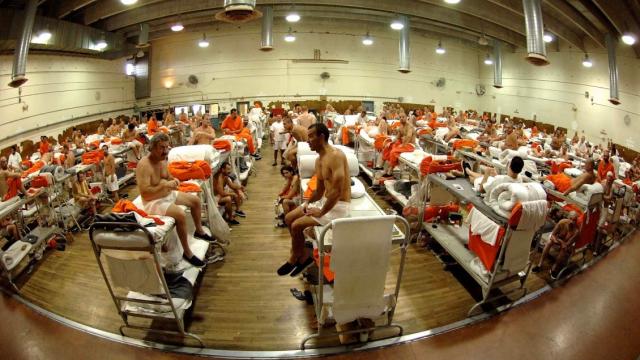
Last month the state of Washington contracted with the GEO Group, one of the largest for-profit prison companies in the U.S., to move up to 1,000 inmates from the state’s overcrowded prisons to its correctional facility in Michigan, thousands of miles from their homes and families. This makes family visits and connection with the community harder, though studies show that inmates who receive more visits are less likely to re-offend after release.
Prisoners can’t vote in the United States and as a result they don’t have much sway over public policy decisions. But private, for-profit prison companies do, their voices amplified by big campaign contributions and millions spent on lobbying. Ahead of the 2016 presidential election, some of the candidates’ ties to the prison-industrial complex raise a lot of questions.
For example, the GEO Group has contributed heavily to campaigns of Florida senator and Republican contender Marco Rubio. And Republican candidate Jeb Bush’s support of for-profit prisons goes back to the 1990s, when he oversaw prison privatization as Florida governor.
Democratic front-runner Hillary Clinton is calling for criminal justice reform, which would reduce profits for private prisons and reduce mass incarceration. The election offers voters a choice between candidates who support the current system that allows corporations to profit from the misery of the inmates and those committed to fundamental reform, which includes changing inflexible sentencing laws and ending the for-profit prison system.
Washington’s contract with the GEO Group is part of the boom in for-profit prisons, whose inmate population increased by 1,600 percent from 1980 to 2009. The privatization of prisons and prison services accelerated during former President Bill Clinton’s administration based on promises of cost savings and better treatment for inmates. For-profit prisons have delivered on neither.
Government-run prisons frequently fail in rehabilitation, in providing medical care and in protecting prisoners from abuse. But private prisons do worse. Poorly paid and inadequately trained guards make for-profit prisons dangerous for staff and prisoners alike. In a 2001 study, the National Council on Crime and Delinquency (NCCD) reported a higher incidence of assaults on prisoners by guards at private prisons than in state and federal prisons.
The U.S. Constitution prohibits cruel or unusual punishment of inmates. Increasingly, private prisons fail to meet even that minimal standard. One egregious example is the Bureau of Prisons’ contracts that require 10 percent of private prison beds to be set aside for solitary confinement. Because private prisons profit from keeping all beds full, this results in overuse and abuse of solitary confinement. This includes instances where immigrant mothers were punished with solitary confinement for protesting deplorable conditions at detention centers.
Other instances of cruel and inhuman punishment come from abusive guards, lacking training and supervision. A 2010 video from Idaho’s infamous “gladiator school” private prison shows guards watching one prisoner beat another unconscious and making no effort to intervene. In fact, reports show that the prison’s officials use “inmate-on-inmate violence to force prisoners to snitch on their cellmates.” A 2011 report by the American Civil Liberties Union on private prisons details horrifying cases of abuse, including instances where cells for juveniles that smelled of urine and feces, insect infestations, racial segregation, punishment for speaking Spanish and refusal of medical and mental health treatment.
Beyond turning prisons over to private companies, governments also contract out health care or food services or telephones or banking services in public prisons. Video conferencing visitation, now set up in many prisons, often comes at a high cost to families and prisoners. Privately run probation and parole services spark concerns about “profitmaking through collection of fees and fines from the offender, with little or no attention paid to an individual’s underlying issues such as substance use or unemployment,” according to a 2012 NCCD report.
The abuse and exploitation of prisoners doesn’t end there. U.S. prisoners often work for pennies making goods for profit. The Ella Baker Center, a non-profit organization working for racial and economic justice, characterizes prison labor as the new slave labor. In 2013 37 states contracted with private, for-profit companies for prison labor. Companies ranging from Starbucks to Victoria's Secret and Microsoft carry products made with prison labor.
Politicians have favored private prisons because they’re supposed to save taxpayer money. But they haven’t: Private prisons’ relatively cheaper operating cost has not translated into lower costs to taxpayers. For-profit prisons typically house less-serious offenders, who are less costly to maintain. Private prison employees receive less training, lower pay and benefits. Yet, the contract cost to state and federal government remains about the same as the per-prisoner cost of publicly operated prisons.
Private prisons do, however, generate corporate profits. A 2012 NCCD study found that private prisons remain highly profitable and growing, despite their failure to deliver on promises of cost savings and improved conditions for inmates. For example, CCA and the GEO Group, two of the corporations that dominate the private prison industry, post combined annual revenue of more than $3.3 billion.
CCA’s 2014 annual report warned shareholders that “relaxation of enforcement efforts, leniency in conviction or parole standards and sentencing practices” or changes in drug or immigration laws could adversely affect their profits. Unsurprisingly, the prison profiteers spend tens of millions of dollars on lobbying and on supporting the campaigns of “tough-on-crime” candidates. Harsh sentencing laws fill prison beds, generating profit for corporations. The most vulnerable people — young, poor, immigrants and people of color — make up a disproportionate number of those prisoners. Ultimately, profit is the worst possible motive for running prisons, or for making laws that govern crime and punishment.
Mary Turck is an adjunct faculty member at Macalester College and a former editor of The Twin Cities Daily Planet.
3 WAYS TO SHOW YOUR SUPPORT
- Log in to post comments
















